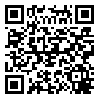Thu, Feb 26, 2026
[Archive]
Volume 4, Issue 3 (9-2014)
Iran J Ped Hematol Oncol 2014, 4(3): 84-88 |
Back to browse issues page
Download citation:
BibTeX | RIS | EndNote | Medlars | ProCite | Reference Manager | RefWorks
Send citation to:



BibTeX | RIS | EndNote | Medlars | ProCite | Reference Manager | RefWorks
Send citation to:
Ordooei M, Akbarzadeh M, Soleimanizad R, Shamsi F, Masoumi Dehshiri R. The effect of iron supplement on children with euthyroid goiter: a randomized placebo-controlled clinical trial . Iran J Ped Hematol Oncol 2014; 4 (3) :84-88
URL: http://ijpho.ssu.ac.ir/article-1-169-en.html
URL: http://ijpho.ssu.ac.ir/article-1-169-en.html
Abstract: (4121 Views)
Background
Endemic goiter is present in most parts of Iran. Iron deficiency adversely affects the physiology of thyroid. The initial steps of thyroid hormone synthesis are catalyzed by thyroperoxidases and are dependent on iron. In many developing countries, children are at high risk of both goiter and iron deficiency anemia. In addition, iron deficiency may alter central nervous system control of thyroid metabolism andalso Iron-deficiency anemia decreases plasma concentrations of thyroxine and triiodothyronine.
Material and method
We conducted a randomized, double-blind,controlled trial in 2-12-y-old children with euthyroid goiter and without iron-deficiency anemia.
The children weredivided into two groups: The Patients who were under treatment with ferrous-sulphat and controls .active treatment consisted of iron supplementation was administered orally with a dose of 2 mg/kg day. The duration of active treatment was 12 weeks.
Results
In this study 40 children (female: 22, male: 18) were divided into two groups randomly. (20 patients in each group).There were no significant differences at baselines between groups with regard to gender, age and weigh.
At the end of the study, the reduction of more than one grade of goiter was significant between iron-treated and placebo groups. In treatment group, 16 patients (80%) had decreased grade of goiter, while in the control group, 3 patients (15%) had grade reduction(P-value<0.001).
Conclusion
At the end of the study, decrease of more than one grade of goiter had significant differences between iron-treated and control groups.
Type of Study: Research |
Subject:
Heart
Received: 2014/09/11 | Accepted: 2014/09/11 | Published: 2014/09/11
Received: 2014/09/11 | Accepted: 2014/09/11 | Published: 2014/09/11
| Rights and permissions | |
 |
This work is licensed under a Creative Commons Attribution-NonCommercial 4.0 International License. |



